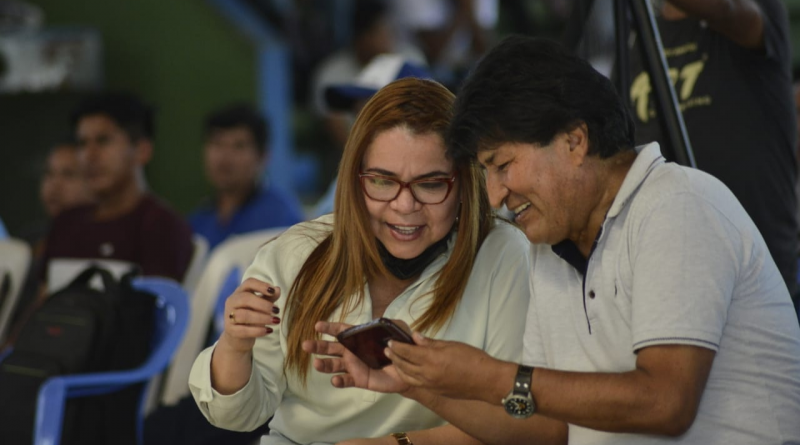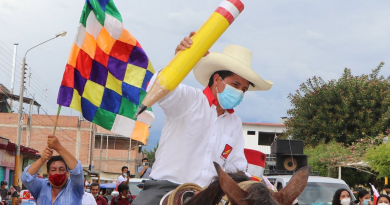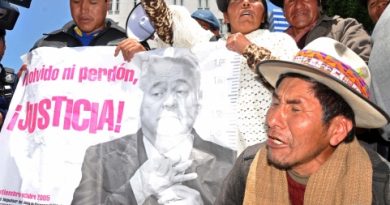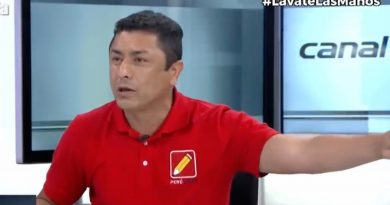Venezuela & Bolivia’s Unbreakable Bond: Interview
Kawsachun News spoke exclusively to Iris Varela, Vice President of Venezuela’s National Assembly. The PSUV lawmaker recently visited the Trópico of Cochabamba, Bolivia, to give a lecture on the Bolivarian Revolution to the youth wing of the 6 Federations, the umbrella organization of the region’s campesino unions. We discussed the historic bonds between our two countries and the political situation within Venezuela as it confronts the US economic blockade and intervention.
What do you make of the political school that has been organized here today?
It’s wonderful to be here in Bolivia, I feel as if I’m at home. It’s not a coincidence that today marks 238 years since the birth of Simon Bolivar, the father of Venezuela and Bolivia, he founded Bolivia as an independent state. This event, organized by comrade Evo Morales, has been intense and it’s impressive how the youth have been brought together by this union. Everyone came with a hunger to learn because that’s how we guarantee this revolutionary process that has lifted up the people of this continent. We won’t ever lower our flag, because we have principles to defend, and those principles can’t ever be negotiated. Those principles are; defend the interests of the country, defend the interests of the dispossessed.
My favorite part of today’s school was the questions from the floor that came after the speeches, it made for important debate and discussion. They were questions that all young revolutionaries make and they open the path for these ideas to be more than just theories, for them to become practice. Anyway, I’m very happy to be here, I wasn’t born here but I feel Bolivian!
Bolivia and Venezuela share so many heroes; Bolivar, Sucre, and I think we can also add Chavez. In all the union halls of this region, there is a mural of Comandante Chavez. What are some of the important historical lessons that Bolivians can learn from Chavez?
Bolivar and Chavez are the giants of Venezuelan history, but in reality, we have many more because it’s the indigenous peoples who resisted colonialism long before them. Though of course, the process of independence is articulated by Simon Bolivar, his vision, his actions, won what we value most which are our independence. That flag was then picked up by Comandante Chavez. In Venezuela, he is considered to be the second liberator. Chavez also had a vision for uniting the American continent, for uniting South America. Before Chavez, Venezuela only looked to the North, but what are we going to find in the North? The people with who we have things in common are in the South. Chavez takes the anti-imperialist thinking of the liberator Simon Bolivar, he takes Bolivar away from the elites and puts Bolivar to walk with the people. That’s a great victory of Chavez.
Under the coup, Bolivia joined the Lima Group, diplomatic ties with Venezuela were cut. However, Bolivians restored democracy, we defeated the coup with a landslide election victory for the MAS. How did Venezuelans feel upon receiving that news, upon seeing the images of that victory?
Bolivia defeated the empire, and we’re enormously proud of that because we identify with that victory as part of the Patria Grande. Here are the children of Bolivar all standing up against the empire and defeating it. In Venezuela we also defeated it. The revolution that is being developed in Venezuela and Bolivia has defeated gringo interventions, coups, and halted the advance of fascism in all its perversity. It was painful to see the images of all the people who were killed here by the coup against President Evo. We saw how the representatives of the empire, such as the chief of the OAS – who should be brought to justice – were unmasked. The struggle of the Bolivian people unmasked all those phonies, those puppets, those murderers. Those people represent pain and death for the people of Latin America.
In Venezuela we’ve faced difficult periods up against the fascists who think they have impunity to commit crimes, they think the arm of justice won’t catch up with them. Here in Bolivia the arm of justice is reaching them, bit by bit they’re falling and going to jail and they’ll have to answer for their crimes. In Venezuela we’ve been fighting against them, we had a recent victory too where we won a majority in the National Assembly where I’m now Vice President. However, some of the fascists have committed crimes for which they’ll have to answer for. We look at what’s happened in Bolivia with healthy envy because the crimes of the coup aren’t being left in impunity, and they won’t be left in impunity in Venezuela, that’s a promise.
Perhaps a healthy envy that Bolivians have of Venezuela is the ‘civic-military union’. The coup forced us to reflect on why the Armed Forces turned their guns on the people. What are some important lessons from Venezuela?
We have to remember that beyond the uniform, those who wear it are also citizens, they’re also humans. The uniform cannot be used to attack interests, to violate people’s rights and collective interests, the uniform is there to be at the service of the people. In Bolivia, the people built the Plurinational State, so it was shocking to see the military attack the construction of the Plurinational State, attack its symbols like the wiphala. Those in uniform have the obligation to defend these symbols of the people, to defend these struggles of the people. They have to be prepared to give their lives to ensure the people’s will and sovereignty is respected. We have political roles that are temporary, but the institutions stay for the future, the reconfiguration of the state after a revolutionary process has to continue after we’re gone.
Yes, mistakes in politics come with a price, crimes don’t stay in impunity. In Venezuela there are opposition politicians who participated in the recent legislative elections and won seats, we have a majority of course, but the opposition has its representation, but then due to internal discussions within the right they threw that away and joined the course of those who want to carry out a coup. Others have decided to stay within the democratic process, they’ve formed parties and presented candidates.
Chavez came from the military originally, and with him, we built a new concept of how to organize the Armed Forces, a new concept for the education and ideology of those in uniform that ties those institutions to the struggles of the people. Without that thinking the country is in a dangerous position, then the Armed Forces can serve up the country on a platter to other interests. That’s the importance of the civic-military union.
There are local elections coming up in Venezuela this year, how is that electoral process coming along?
The United Socialist Party of Venezuela (PSUV) is the largest party in the country and one of the largest in the region. There are millions of members who have helped to develop a formidable doctrine and organization. Perhaps this will sound like triumphalism, but I think it’s very unlikely that we’ll lose this year because we’re formed in thinking of Hugo Chavez, we always organize to win because our revolution advances through the electoral path.
Among the opposition, there are some who participated in coups, some who went to jail for that, and thanks to a process of dialogue have come out and have come to the realization that if you want a position of power in Venezuela, you have to earn it at the ballot box. No one can declare themselves into power here, even if you want to be President of your neighborhood committee then you have to submit yourself to elections. The opposition has to participate if they want power, they’re welcome to participate.
It seems that the right-wing opposition is divided on that question.
We’re all aware that some in the opposition will never come into the democratic fold because they take orders from the US, they receive money from the US that’s taken from our public assets they seized, assets that belong to the people and should be distributed to the people. There are sections of the opposition who agree that those elements should face justice in Venezuela.
The economic blockade in Venezuela has had brutal effects, what are some ideas and proposals being discussed for how to defeat these sanctions?
Before this situation, we had built a national economy that was generating growth thanks to our oil supply. Until it occurred to them to sanction anyone at all that tries to buy our oil. We couldn’t sell our oil in the quantities that we were producing, this caused a dramatic drop in revenues which is money that could have been used to tend people’s needs. It’s an incredibly difficult situation, but we have to rise to the challenge. It’s forced us to generate more self-sufficiency and reactivate production that had collapsed after the sanctions. At one point there was not even enough gas to fuel people’s cars, but now there is production restarting bit by bit.
Comandante Chavez left us a number of tasks, one of them is the construction of a multipolar world, that’s why we’re pushing relations with China, Russia, Iran, Turkey, and others, because here in the continent there is a campaign to isolate us that’s possible because the US has dominated trade relations which they exploit to dominate countries, so we need trade and relations around the world too because if the US decides to tighten the screws further here then we’d be left without economic activity. Chavez understood that and President Maduro has continued that work, lets not forget that Maduro was Chavez’s Foreign Minister, and he learned a lot from Chavez, so he continues building these international relations so that we can overcome the attempts by the US to strangle our economy.
Any last message for the youth here about the importance of political education?
What was interesting here was the debates and questions that young people had on different issues. One of the most important issues is that of the media because the media is often used to build false narratives. They did it in Libya, they did it in Venezuela and Cuba, using images of Egypt and other countries to say that there were large protests in our countries. To face this in Venezuela, we’re building a university to train people in media skills, in social media skills. We’re formally inviting the youth of the 6 Federations to come for that, to have an exchange with the JPSUV so people here can come to Venezuela and so they can come here. Our Bolivian brothers will always be welcome to the country of our shared liberator, to learn and to build cadres that can at any moment, defend the revolutionary processes built by the people, by Bolivar, by Sucre, and everyone who has given their life to win our independence and freedom.



